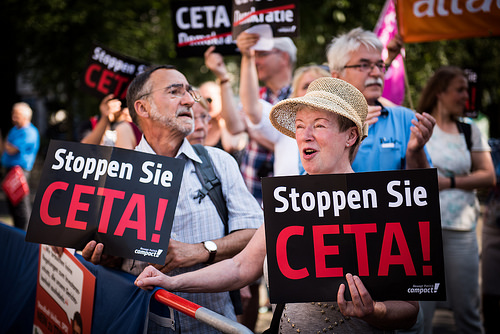UK turns to Canada for advice on striking post-Brexit trade deals with EU

The Guardian | 15 July 2016
UK turns to Canada for advice on striking post-Brexit trade deals with EU
by Sarah Butler and Angela Monaghan
The UK has sought advice from Canada on how to secure a trade agreement with the EU following the Brexit vote, the Canadian trade minister has said.
Chrystia Freeland told BBC Radio 4’s Today programme that her team had been having “technical exchanges” with Britain about Canada’s recently finalised deal with the EU.
She was speaking before a meeting with Liam Fox, the UK’s secretary of state for international trade.
“As members of the Commonwealth they agreed to build a stronger, closer relationship in a number of areas including trade and prosperity,” a spokesperson for the new department said. “The ministers expressed a wish to work together better to promote the opportunities and benefits of globalisation and to think about how to get more SMEs exporting.”
On Thursday, David Davis, the minister for Brexit, said his preferred model for the UK’s continuing relationship with the EU is Canada’s comprehensive and economic trade agreement (Ceta).
Speaking on Friday, Freeland said: “We have been sharing, at a technical level, details of how Ceta works.”
However, she said securing such deals was “very, very complicated. There are 300 trade negotiators in Canada. It takes a big expert team to negotiate trade agreements.”
The UK does not have the expertise to negotiate trade deals, as for decades agreements have been conducted at EU level. Whitehall is scouring business, the European commission, and friendly countries including Canada for trade specialists to help lead talks.
The government has said it plans to hire up to 300 staff to try to address a shortage of trade negotiators capable of forging closer economic ties to dozens of other countries. Oliver Letwin, who was going to run the Brexit unit before losing his role in Theresa May’s cabinet overhaul, told the BBC: “We don’t have trade negotiators because the trade negotiation has been going on in the EU so we are going to have to hire a whole – David Davis is going to have to hire – group to deal with the EU negotiations, and Liam Fox, of course, in what I think is an excellent plan of Theresa’s to create a new Department of International Trade.”
Gregor Irwin, chief economist at the Global Counsel consultancy and a former chief economist at the Foreign and Commonwealth Office, said the government had people who understood trade policy, but did not have negotiators.
“No doubt people will have to be brought in from outside. They will look to get people wherever they can find them, and Canada and New Zealand would be good places to look. This is a huge agenda and it’s a long process.”
Davis has said that article 50, the formal process for negotiating the UK’s exit from the EU, should not be triggered until the end of the year, from when Britain would have two years to negotiate its trading terms with the 27-nation bloc.
Canada took seven years to finalise its deal with the EU and it is not expected to be implemented until 2017.
A top US trade official said on Thursday that he had held preliminary discussions with British officials about how the two countries could pursue bilateral trade relations post Brexit.
Freeland said Canada had secured a “gold standard” deal with the EU. However, she made clear that while it had secured “ambitious services agreements”, it would not enjoy the same level of “passporting” that the UK currently has as a member state – a status that enables banks and financial services businesses to trade freely.
The Canadian deal also does not offer the same level of freedom of movement for professionals as that within EU member states. While the control of borders and worker movement is something Brexiters have argued for, Freeland said: “Canada’s position is to be ambitious in mobility. We think that facilitates trade.”





